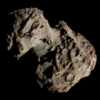C/1961 R1 (Humason)
 Comet Humason photographed from the Palomar Observatory on 4 September 1962 | |
| Discovery | |
|---|---|
| Discovered by | Milton L. Humason |
| Discovery date | 1 September 1961 |
| Designations | |
| 1961e 1962 VIII | |
| Orbital characteristics[1] | |
| Epoch | 12 May 1963 (JD 2438161.5) |
| Observation arc | 1,517 days (4.15 years) |
| Number of observations | 80 |
| Aphelion | 408.71 AU |
| Perihelion | 2.133 AU |
| Semi-major axis | 205.42 AU |
| Eccentricity | 0.98961 |
| Orbital period | 2,883 years (inbound) 2,516 years (outbound) |
| Inclination | 153.278° |
| 155.439° | |
| Argument of periapsis | 233.562° |
| Last perihelion | 10 December 1962 |
| TJupiter | –1.588 |
| Earth MOID | 1.2247 AU |
| Jupiter MOID | 1.0725 AU |
| Physical characteristics[2][3] | |
| Dimensions | 30–41 km (19–25 mi) |
| Comet total magnitude (M1) | 1.35–3.5 |
| Comet nuclear magnitude (M2) | 10.1 |
Comet Humason, formally designated C/1961 R1 (a.k.a. 1962 VIII and 1961e), was a non-periodic comet discovered by Milton L. Humason on 1 September 1961. Its perihelion was well beyond the orbit of Mars, at 2.133 AU. The outbound orbital period is about 2,516 years.
Physical properties
[edit]It was a "giant" comet, much more active than a normal comet for its distance to the Sun, with an absolute magnitude of 1.35−3.5,[3] and a nucleus diameter estimated at 30–40 km (19–25 mi).[2] It could have been up to a hundred times brighter than an average new comet. It had an unusually disrupted or "turbulent" appearance.[4] It was also unusual in that the spectrum of its tail showed a strong predominance of the ion CO+, a result previously seen unambiguously only in C/1908 R1 (Morehouse).[5]
See also
[edit]References
[edit]- ^ "C/1961 R1 – JPL Small-Body Database Lookup". ssd.jpl.nasa.gov. Jet Propulsion Laboratory. Retrieved 29 May 2019.
- ^ a b "Comets: Comet Humason 1961e". Irish Astronomical Journal. 6: 191. 1964. Bibcode:1964IrAJ....6Q.191.
- ^ a b M. R. Kidger (3 April 1997). "Comet Hale–Bopp Light Curve". jpl.nasa.gov. NASA / JPL. Archived from the original on 7 April 2023. Retrieved 10 January 2025.
- ^ J. C. Brandt; R. D. Chapman (2004). Introduction to Comets. Cambridge University Press. p. 156. ISBN 978-0-521-00466-4.
- ^ W. F. Huebner (1990). Physics and Chemistry of Comets. Springer-Verlag. p. 246. ISBN 978-0-387-51228-0. ISSN 0941-7834.
External links
[edit]- C/1961 R1 at the JPL Small-Body Database


